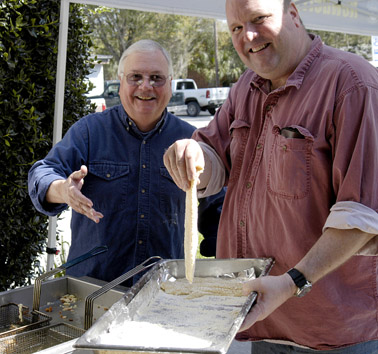 Ellen Boukari/Alachua County Today
Ellen Boukari/Alachua County Today
L-R: Lowell Garret and Reuben Hamlin handled the fish frying duties for the Newberry Main Street Organization. The fish fry was a fundraiser to support the organization’s activities.
NEWBERRY – Hungry visitors stopped by the Newberry Municipal Building, 25440 West Newberry Road, on Saturday, March 15, to help their town economically and to also fill their stomachs with a yummy fish dinner with all the trimmings.
Newberry Main Street Organization, Inc. (NMSO) produced a dine-in-or-take-out dinner of mouthwatering fried fish, coleslaw, beans, hushpuppies, grits and iced tea as one of several fundraising events planned for this year.
To top off the tasty meal, baked goods were also available for purchase for those who had a little bit of room left for a tasty treat. The Newberry High School Baseball Booster Club sold brownies, cookies, cupcakes and more as their fundraiser in an admirable attempt to satisfy everyone's sweet tooth, while earning a little money for their club.
One of the highlights of the event was a drawing for a $50 gift certificate to Gander Mountain sporting goods and clothes store in Ocala. The winning ticket was purchased by Trenton resident Greg Landingham.
“We couldn't have done it without the help of Newberry's Backyard BBQ, Visit Gainesville and the City of Newberry,” said Barbara Hendrix, NMSO Director. “The turnout was great,” she said.
NMSO's Mission Statement, “Enhancing a downtown through sound economic development that promotes our future while preserving the past,” is embodied in the events and projects undertaken each year to attract visitors to historic Newberry.
In addition to providing visitors with a Tourism Information Center, NMSO also produces the Newberry Farmer's Market on a monthly basis throughout the growing season, the Newberry Spring Fling Festival in early April, the Fall Festival in October, the Festival of Lights in December and provides a free website for others to advertise local events. All of these projects help boost tourism, increase visitors to the downtown business community and provide a central online location for residents and visitors to discover other community events.
In an attempt to balance their budget this year, the city reduced their contribution to NMSO from $40,000 to $25,000 in an across-the-board budget reduction. The funding change left NMSO with a $15,000 shortfall. “While we do fundraising every year, we are beefing up our efforts this year to help make up for those lost funds,” said Hendrix. “We want to continue to bring new people into Newberry to see what a wonderful town we have and to meet our friendly residents and business people,” she said. The NMSO Board thought this type of fundraiser would serve two functions...to bring residents a great meal and also help make up for some of the funding shortfall, she said.
In addition to the city's funds, NMSO receives revenue through memberships, donations, festivals, sales of artwork through the Newberry Firehouse Gallery and through the Farmer's Market.
NMSO has also written grants which have led to funding of some events. “Every one of those grants requires us to make reports back to the funding group to prove that the money is actually bringing people into Newberry,” said Hendrix. “It takes some time to do all of that, but it's well worth it when I hear business owners say they have made enough money in one day [in tandem with one of our events] that they were able to pay their bills for the month,” she said.
Anyone interested in becoming a member of the organization or learning more about the events and programs sponsored by NMSO, may stop by the Newberry Fire House Gallery, 25435 W. Newberry Road, call 352-472-2112 or check them out online at NewberryMainStreet.com.
# # #
Email cwalker@
alachuatoday.com
Add a comment


 Carl McKinney/
Carl McKinney/ Carol Walker/
Carol Walker/